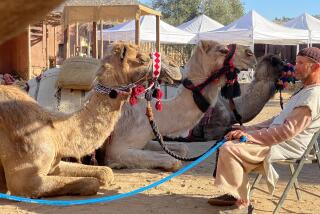Camels Are Never Over the Hump : If Poor Beasts Are Not Being Beaten, They’re Being Eaten
- Share via
CAIRO — Mohammed Weheibi nervously adjusted the six gold and onyx rings on his stubby fingers, lighted a cigarette with his Dunhill lighter and said through a haze of exhaled smoke: “This much I have learned in life: It is better to be a seller of camels than to be president of Egypt.”
The other men in the smoke-filled room laughed and vigorously nodded their assent. Being president is a thankless task, but selling camels, while it has its ups and downs, is a good, honest profession for a man, they all agreed.
There were six other men in the small hut, and they sat stiffly along a narrow bench against the far wall, looking like members of a police line-up taking a break. They were Weheibi’s younger brothers and cousins who, upon hearing that he was being interviewed about selling camels, had naturally decided that they, too, should be interviewed about selling camels, which has been the way the Weheibi family has earned its living for over three generations.
Stupid or Smart?
“Camels are very stupid,” said a voice from one end of the bench.
“If you think that, you are stupider still,” a voice from the other end responded. “Camels are very smart.”
“Now you see why I would not be president,” Weheibi interjected, still enjoying his joke. “I am responsible for four brothers, and they give me enough trouble. Why should I want to be responsible for 50 million more?”
Outside, in the hot, dusty courtyard, there was a loud crashing sound, a chorus of curses in Arabic, the swish and crack of whips and a bellow of protest--halfway between a growl and a rasping cough--that is the camel’s peculiar bray.
One beast, perhaps seized by some primitive premonition of its destiny, had somehow loosened the rope that hobbles its left front leg and was making its last bid for freedom. After more scuffling and more curses, it was subdued.
Largest Camel Market
The Cairo camel market, reputedly the world’s largest, is a colorful sight but, to an animal lover, not an especially attractive one. The camels are roughly treated--whipped, kicked and pushed along on their hobbled legs--because they are all destined for the slaughterhouse.
Virtually all the 30,000 camels on which Weheibi collected commissions last year were sold for slaughter.
“I could sell many more, too. I could sell 100,000 if I could get them,” he added.
The camels mostly come from western and eastern Sudan, by caravan to Aswan in Upper Egypt and from there by train or truck to Cairo. But a quota agreement between Egypt and Sudan now limits the number of camels that may be imported.
Long-Dead Images
Westerners, when they think of camels, might still conjure up images of Lawrence of Arabia, the Arab Legion and the great silk-and-spice caravans that plied the vast Arabian wastes a century and more ago. But what Weheibi and his brothers and their cousins think of is the grilled minced meat called kofta and the smoked meat that looks like pastrami and is sold here under that name but which--deli lovers take heed--is really cured camel flesh.
Camels are still used for sport in Saudi Arabia, where the king’s camel race is an annual tradition, and as beasts of burden in Egypt, Sudan and other poor countries. But their once-pivotal role in the economies and social traditions of much of the Middle East has been on the decline since the advent of the pickup truck.
With its oil wells, international airports and fleets of sleek Mercedes-Benzes, the Arabia of today is as far removed from the romance of Lawrence’s day as central London is from Arthurian legend. Apart from its value as a tourist attraction, the camel’s main virtue nowadays is as a source of cheap protein.
‘The Best Part’
“The best part is the meat just under the hump,” said Kassem Ahmed Salama, a Cairo butcher who has just bought four camels from Weheibi at an average price of 870 pounds ($635) apiece. “It is very tasty. Four pounds 50 per kilo (about $1.50 per pound) it commands.”
Salama will take the camels back to his slaughterhouse, where he will slit their throats so that they may bleed to death according to the Islamic prescription for killing animals. While not intended to be cruel, it is a slow and painful death.
It also involves some risk for the butcher. “Camels are mean and uncooperative. They make it very tough,” Salama said, suggesting the camels should somehow consent to their own slaughter.
Some People Bothered
While kindness to animals has never been assigned a high priority in this part of the world, the slaughtering of camels does bother a few people who consider the camel a truly remarkable beast that deserves a better fate.
Gamal Mohieddin, who grew up around camels in his native Nubia and is now a Cairo office manager, thinks camels have acquired their reputation for surliness only because they are so frequently mistreated. Show a camel kindness and it will respond in kind, he said.
Mohieddin remembered, for instance, the time in his boyhood when he ran away from home and found work on a farm, helping to raise a young female camel. The camel, whom he named Abu Durwa after a Nubian mountain, was eventually sold to a trader and taken away. But weeks later, it broke free and returned to the farm, trotting around after Mohieddin and refusing to leave his side.
The trader returned and took Abu Durwa away again, this time on a stronger rope. A year later, Mohieddin was strolling through the Aswan market when, as he tells it, “this camel started following and trying to nuzzle me.”
Still Gets Misty-Eyed
“I turned around, and it was Abu Durwa, and I saw she was crying,” Mohieddin recalls. “It is a fact--camels can cry. I hugged her, and we were both crying. I wanted to buy her, but I didn’t have the money.” Now, years later, Mohieddin still gets misty-eyed when recounting the story.
“Camels will be mean if you mistreat them,” Mohieddin added. “But they will also respond to love. They need love. For love they will obey all your orders and do anything you want and always be your friend.
“I will not eat kofta because of this,” he added, his voice suddenly rising in vehemence. “Never. Never will I eat their meat.”
Back at the Cairo camel market, inside Weheibi’s small hut, the debate continued over the intelligence and character of camels.
Weheibi finally ended the argument, dropping his voice into the serious tone that he, as the eldest brother, uses to settle all family disputes.
“Camels are very intelligent, more intelligent than horses,” he said. Then, with what might have been a twinge of guilt as Salama the butcher led his four camels away, he added, “And they are better than human beings, for they, unlike us, are not treacherous.”
More to Read
Sign up for Essential California
The most important California stories and recommendations in your inbox every morning.
You may occasionally receive promotional content from the Los Angeles Times.












